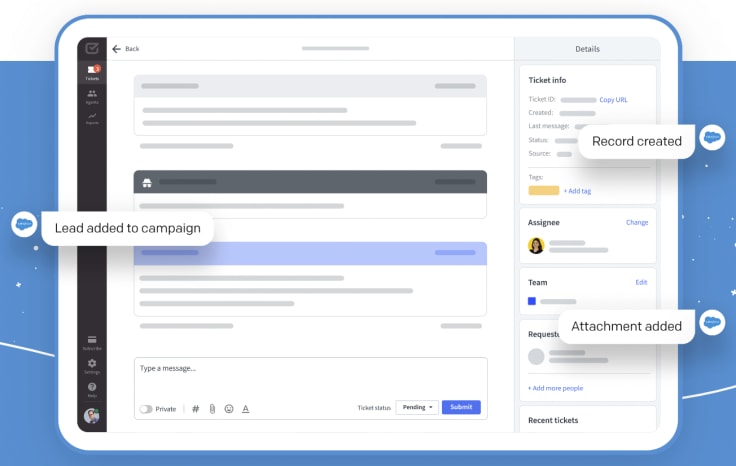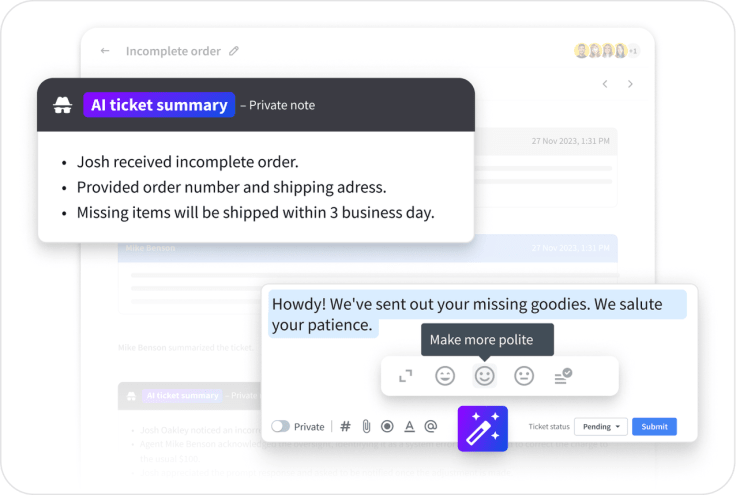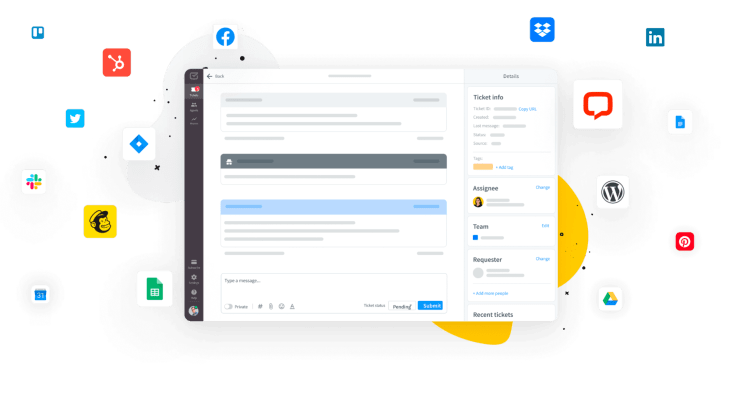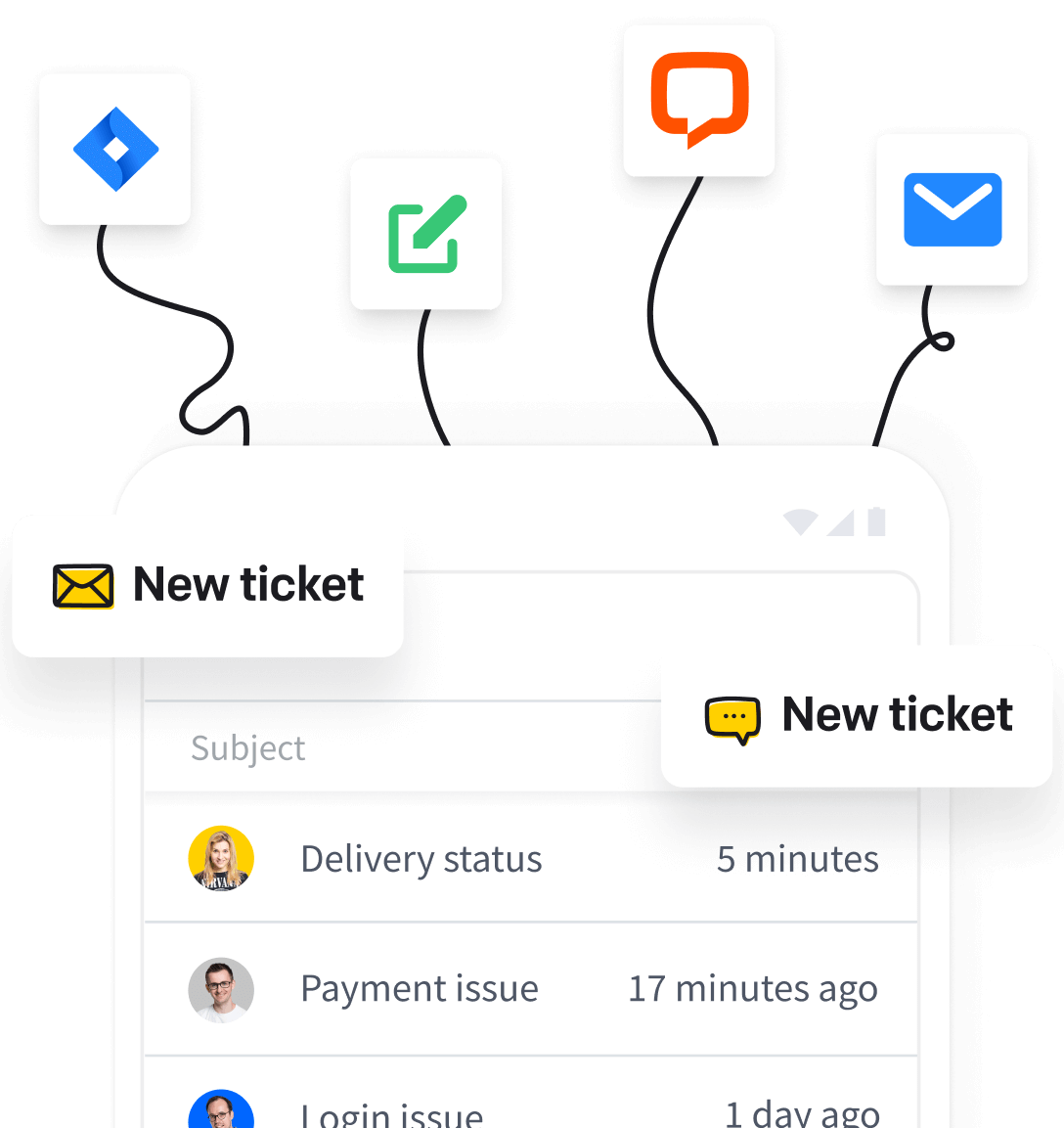Unlocking Growth and Loyalty: The Benefits of CRM Systems in Business
Weronika Masternak

CRM systems are more than tools; they’re engines driving growth and loyalty in business. Consider this: 36% of sales pros struggle with deal closures, but with a robust CRM, they see up to a 300% jump in conversion rates. That’s a significant leap forward.
Looking to boost customer relations or streamline sales? Embracing CRM software might be your smartest play. In a customer-focused world, these systems are crucial in helping businesses meet and surpass customer expectations.
In this article, we’ll uncover nine key benefits of CRM systems that are transforming business-customer interactions and operational management:
-
Enhanced customer relations for stronger connections.
-
Improved sales efficiency for quicker results.
-
Effective marketing strategies tailored to your audience.
-
Centralized data management for easy access.
-
Enhanced analytics and reporting for informed decision-making.
-
Cost reduction and increased profitability.
-
Scalability and flexibility to match business growth.
-
Enhanced team collaboration for better productivity.
-
Improved customer support for timely resolutions.
Ready to unlock all the benefits and potential of CRM systems for your business? Let’s dive into these benefits and see how they can revolutionize your approach to customer relationship management and business growth.
What is a CRM System?
A CRM (customer relationship management) system is a digital hub for managing all aspects of customer relationships. It transforms customer data into actionable insights, automating marketing and sales processes. Each CRM system is tailored to specific business needs, enhancing customer interactions and streamlining operations.
In today’s customer-centric business world, CRM systems are essential. They empower businesses to anticipate customer needs, fostering stronger relationships and driving growth. Integrating a CRM system means navigating market complexities with greater agility and turning every customer interaction into a growth opportunity.
Integrate HelpDesk with your CRM, such as Salesforce, to streamline your customer relationship-building activities 🏗️ Try HelpDesk for 14 days for free!

What are the benefits of CRM?
CRM solutions are transformative business software that elevates every aspect of managing customer relationships, fostering growth and efficiency.
1. Enhanced customer relations
CRM platforms are not just tools but the cornerstone of building and nurturing strong customer relationships and enhancing customer retention. They enable personalized and timely interactions, making customers feel truly valued and understood.
Imagine a CRM reminding you of a customer’s birthday, allowing you to send a personalized greeting. This small gesture can significantly enhance customer loyalty, especially when 94% of customers are likely to make repeat purchases from a source they’ve used before.

HelpDesk’s efficient ticketing system ensures that your customer service team addresses every customer query promptly and personally, a key benefit of CRM in managing customer relationships. This adds another layer of attentiveness to customer interactions, crucial in a world where 68% of customers may leave a business due to perceived indifference.
2. Improved sales efficiency
CRM solutions are vital in streamlining the sales process and enhancing the efficiency of CRM platforms in business operations. They efficiently manage leads, track sales progress, and forecast future sales activities, ensuring no opportunity slips through the cracks.
A CRM might highlight a potential lead when customers frequently view a specific product category. This insight allows the sales team to reach out with targeted offers or information, capitalizing on the fact that 80% of consumers prefer personalized experiences.

HelpDesk complements this by automating routine tasks with AI-driven features, freeing up the sales team to focus on these identified opportunities and refine their sales strategies.
3. Effective marketing strategies
CRM systems are crucial for crafting targeted marketing campaigns based on customer preferences and behaviors.
Utilizing CRM solution data, you can segment customers based on their purchase history, enabling more personalized and effective marketing efforts, a significant benefit of a CRM platform. This approach is key, considering that 90% of people find personalization makes a website more appealing.

HelpDesk enhances this by enabling multi-channel communication, ensuring that marketing messages are delivered through the customer’s preferred channels, thereby increasing marketing campaign effectiveness.
4. Centralized data management
A CRM system centralizes customer data as a central database as part of its business software capabilities, offering a unified, up-to-date view of all customer interactions, which is crucial for managing customer relationships.
Sales teams can use CRM data to understand a customer’s service history, identifying potential upsell or cross-sell opportunities. With 87% of businesses now using cloud-based CRM, the importance of centralized data management is more evident than ever.

HelpDesk enhances this centralization of the customer journey by integrating various communication channels into a single dashboard, ensuring easy access to all customer information and interactions.
5. Enhanced analytics and reporting
CRM platforms provide advanced analytics and reporting features, offering deep insights into customer behavior and business operations, a key benefit of CRM systems.
CRM analytics can reveal trends in customer buying patterns, aiding in tailoring sales and marketing strategies. This is crucial, as CRM applications can increase revenue by up to 41% per sales representative.

HelpDesk’s real-time reporting complements CRM analytics by providing detailed performance metrics. This synergy allows for a deeper understanding of customer interactions and support effectiveness, aiding in making informed business decisions.
6. Cost reduction and increased profitability
CRM solutions lead to operational efficiency in the way they manage customer relationships and business processes, resulting in significant cost savings and increased profitability.
Automating customer follow-ups within a CRM can reduce the need for manual outreach, saving time and resources. This is vital in a landscape where 32% of sales representatives spend over an hour each day on manual data entry.

HelpDesk aligns with this efficiency by automating repetitive tasks in customer service. This reduces the workload and contributes to financial efficiency and long-term profitability, in line with the average CRM ROI of $8.71 for every dollar spent.
7. Scalability and flexibility
As businesses grow, the need for scalable and flexible CRM solutions becomes paramount, highlighting the adaptability of CRM platforms. CRM systems are designed to adapt and scale according to the evolving needs of a business.
A growing business can expand its CRM database to accommodate increasing customer profiles and track customer interactions further. This adaptability is crucial, considering that in 2008, only 12% of businesses used cloud-based CRM, which has now increased to 87%.
HelpDesk’s scalability is a perfect match here. It offers customization and integration capabilities that cater to businesses of various sizes and types, ensuring that your customer support system evolves seamlessly alongside it as your business expands.
8. Enhanced team collaboration
Effective teamwork is crucial for business success, and CRM platforms facilitate this by enabling the customer service team and other departments to share and analyze customer data.
A CRM enables a marketing team to access sales data for better campaign planning, ensuring that all departments align their strategies and goals. This collaborative approach is essential, as effective sales organizations are 87% more likely to be consistent users of CRM or another system of record.

HelpDesk enhances this collaborative spirit by allowing team members to share information and work together efficiently on resolving customer tickets. This integration ensures that all team members are on the same page, leading to more cohesive and effective customer service.
🏃 Move your team to HelpDesk to feel the difference when it comes to collaboration and communication with customers. Try HelpDesk for 14 days for free!
How does CRM help small businesses?
CRM systems aren’t just a luxury but a necessity for small businesses, acting as a catalyst for growth and efficiency. They offer an array of tools that enhance customer engagement, streamline sales processes, and optimize marketing efforts, making them indispensable for ambitious, growing businesses.
Improved customer relations
CRM systems are pivotal in forging lasting relationships with customers. They allow small businesses to store comprehensive customer details, enabling personalized interactions that resonate with customers.
For instance, a CRM can track purchase history, allowing businesses to recommend similar products or services, thereby enhancing customer loyalty. This level of personalization is key in today’s market, where customers expect businesses to understand and cater to their unique needs and preferences.
Increased sales
CRMs are powerful tools for boosting sales in small businesses. They help identify potential leads and nurture them through the sales funnel. By analyzing customer behavior and interaction patterns, CRMs enable businesses to approach customers with the right product at the right time.
For example, a CRM could alert you when a customer repeatedly views an item, suggesting it’s time to send a personalized offer or discount to clinch the sale.
Enhanced internal communication
Effective communication within a business is crucial, and CRMs play a significant role in facilitating this. Centralizing customer information allows team members from different departments to access the same data, ensuring consistent and informed customer interactions.
This is particularly beneficial for aligning sales reps and customer service teams, as they can collaborate more effectively to enhance the customer experience.
Efficiency in marketing
For small businesses, every marketing dollar counts. CRMs help in targeting marketing efforts more precisely, leading to better ROI. By segmenting customers based on their behavior and preferences, businesses can tailor their marketing messages to different groups, increasing the relevance and effectiveness of their campaigns.
For instance, a CRM could help identify existing customers interested in a specific product line, allowing for targeted email marketing campaigns.
Customer data organization
The organization of customer data is a major strength of CRM systems. They provide a structured and accessible way to store and manage customer information, essential for quick and efficient customer service.
This organization helps track customer interactions across various channels, ensuring no detail is missed. For small businesses, this means being able to provide customers data with a level of service that rivals larger competitors.
Automation of everyday tasks
Automation is a key feature of CRM systems that significantly benefits small businesses. By automating tasks such as data entry, lead nurturing emails and scheduling, CRMs save precious time and reduce the likelihood of human error.
This automation also extends to customer interactions, with features like automated responses to common queries and reminders for follow-ups. For a small business, this means maintaining high-quality customer interactions even with limited staff resources.
Improved customer service
CRMs empower small businesses to provide exceptional customer service. With instant access to a customer’s history, preferences, and prior interactions, service representatives can offer tailored and efficient support. This capability is crucial in resolving issues quickly and effectively, leading to higher customer satisfaction.
For example, if a customer contacts support, the representative can immediately access their history and provide a solution without asking repetitive questions.
Data-driven decision-making
In the modern business landscape, data-driven decisions are key to success. CRMs give small businesses the analytics and insights needed to make informed choices. These insights, from sales trends to customer feedback, guide businesses in refining their strategies and operations.
For instance, a CRM can show which products are bestsellers, helping businesses focus their inventory and marketing efforts more effectively.
Scalability
The ability to scale is essential for growing businesses, and CRMs are designed to accommodate this growth. As a business expands, its CRM can handle an increasing customer base, more complex sales processes, and a broader range of data.
This scalability means that small businesses can continue using their CRM system without needing costly upgrades or replacements, ensuring a smooth growth trajectory.
Cost efficiency
Cost efficiency is often a top priority for small businesses, and CRMs contribute significantly in this area. By improving operational efficiency and reducing the need for additional staff or resources, CRMs offer a cost-effective solution. The increased sales and customer loyalty generated by effective CRM use can also lead to higher overall profitability.
In the long run, the investment in a CRM system can pay off many times over, making it a wise financial decision for small businesses looking to grow and succeed.
Discover how HelpDesk can enhance your sales team's potential. 🤝 Strengthen customer relationships with our integrated CRM systems. Check HelpDesk for sales!
Summary
CRM systems are indispensable tools in the modern business landscape, offering many benefits that can significantly transform how businesses interact with their customers and manage their operations. CRM systems are pivotal in driving business growth and customer loyalty, from enhancing customer relations and increasing sales efficiency to providing valuable insights through improved analytics and reporting.
The importance of CRM systems in achieving business success cannot be overstated. They streamline various aspects of business operations and provide a scalable and cost-efficient solution that grows with your business. With their ability to automate everyday tasks, improve customer service, and facilitate data-driven decision-making, CRM systems are a wise investment for businesses looking to thrive in a competitive market.
For businesses aiming to enhance their customer relationships, increase profitability, and make informed decisions, implementing a CRM system is a step toward achieving these goals. Whether you’re a small business or a large enterprise, embracing CRM technology can revolutionize your approach to customer relationship management and pave the way for sustained business success.


Get the cheat sheet for solving customer tickets
Join our newsletter to receive your cheat sheet and other amazing content directly in your inbox.
Success! You're one click away from the cheat sheet 👇
Open now
